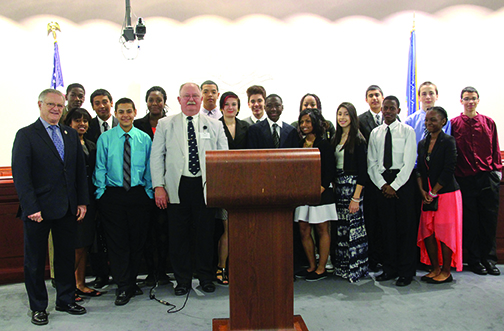
STATE REPRESENTATIVE
Henry Genga

Serving the 10th Assembly District
Legislative Office Building, Room 4030
Hartford, CT 06106-1591
Capitol: 800-842-8267
Henry.Genga@cga.ct.gov
EASING TAX BURDENS ON FAMILIES AND SMALL BUSINESSES
This year, we helped to ease the property tax burden on Connecticut’s families by requiring private colleges and massive healthcare systems to pay their fair share.
Private colleges that own off-campus property will now be required to pay taxes on any property used to house students, just like any other homeowner in town.
Connecticut’s largest health systems will pay taxes on all taxable property purchased after October 1, 2015.
By enacting this law, private colleges and large hospitals will help pay for the services they use, such as fire, police, and public works, just like the rest of us.

PROTECTING SENIORS FROM ELDER ABUSE
This year, I focused on protecting our seniors from elder abuse. Now, when abuse or neglect of an elderly person is suspected, the Department of Social Services (DSS) will be able to petition a probate court to gain access to the residence to investigate. A new standard for elder abuse now includes that of elderly people who do not live alone but whose caretaker fails to provide or arrange to provide for services necessary to maintain the patient’s physical and mental health. If you need to report elder abuse, you can call DSS offices at 1-800-842-1508.
PATIENT-DESIGNATED CAREGIVERS
Some patients end up returning to the hospital soon after discharge because they had not been instructed properly on their follow-up care or were unable to follow instructions. The new CARE (Caregiver Advise, Record, Enable) Act, requires a hospital to include a caregiver in the patient’s discharge plan, if they have been designated by the patient. The hospital must attempt to notify the caregiver of the patient’s discharge and instruct the caregiver on any post-discharge tasks the patient will need assistance with.
GIVING ELECTRIC CONSUMERS THE UPPER HAND
I am proud to have put more power in the hands of consumers by supporting a ban on variable rate electricity, protecting Connecticut residents from electricity providers who offer very low introductory rates that rapidly increase. Competitive electric suppliers must now give their customers a 60-day notice of the end of their contracts and must allow customers who want to switch to standard service the ability to do that within 72 hours. Connecticut is the first state in the nation to enact this important consumer protection law.
EXPANDING COMMUNITIES’ ACCESS TO RENEWABLE ENERGY
Connecticut has some of the highest electricity rates in the nation. To combat this, we need to prioritize investments in renewable energy. With this in mind, I voted to expand the Connecticut Green Bank and to require the Public Utilities Regulatory Authority (PURA) to authorize up to 5% for the purchase of major solar energy components. The Green Bank’s residential solar energy program will offer renewable energy credits, funding assistance and critical training to city officials. This useful tool will help communities like East Hartford develop a smart permitting process that will promote solar energy.

TRANSPORTATION FUNDING
The budget is balanced, under the spending cap, and it invests in Connecticut’s transportation infrastructure which is critical to our future economy. By investing in transportation projects, such as the New Haven-Hartford-Springfield rail line, the widening of Connecticut’s highways, expanding the busway in East Hartford, and the I-84 Viaduct in Hartford, roads, bridges, and ports, we are encouraging smart growth, addressing traffic congestion, and bringing sustainable jobs home to Connecticut.
A SECOND CHANCE SOCIETY
Connecticut’s drug policies have filled our prisons with nonviolent drug offenders who struggle to reintegrate into society upon release. The Second Chance Society will ensure public safety, save money, and help end the culture of mass incarceration by lowering sentencing for nonviolent offenses. This initiative will give ex-offenders more opportunity to get back into the workforce – and will also save millions in taxpayer dollars.
MORE STEPS IN CLOSING CT’S EDUCATION ACHIEVEMENT GAP
One of my top priorities is closing Connecticut’s sizable education achievement gap and improving outcomes for our lowest performing students. This year, new laws demand that more teachers be certified in shortage areas, that greater numbers of minority teachers be recruited, and all educators be given strategies to build better relationships with students of different cultures. The Office of Higher Education will annually report to the Education Committee on the demographic background of teachers-in-training.
UPDATES TO OUR EDUCATION LAWS
Each year the State Department of Education and the legislature consider new ways to improve programs and policies. Some of the more significant improvements this year include encouragement of more participation in agricultural internships, allowing national exam results (like ACT and SAT scores) to count toward graduation requirements, and improving the Supplemental Nutrition Assistance Program (SNAP) eligibility notification process. The administration of epi-pens in schools will also be improved, and schools will be allowed to better manage internet access throughout their libraries. Finally, local schools will be given more flexibility to regionalize, and thus cut costs.
IMPROVING MENTAL, EMOTIONAL AND BEHAVIORAL HEALTH
This year, I worked hard to enact several pieces of legislation that will improve Connecticut’s mental health care system. The newly created Children’s Mental, Emotional and Behavioral Health Plan Implementation Advisory Board will bring professionals together to help the state monitor how we are taking care of our young children. The Board was created in the aftermath of the Sandy Hook tragedy. This implementation plan is critical to meeting the mental, emotional, and behavioral needs of our children.
